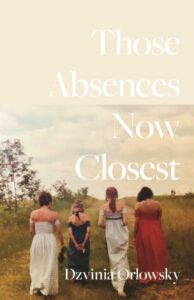 Review by Lisa C. Taylor
Review by Lisa C. Taylor
With breathtaking originality, Those Absences Now Closest propelled this reader into the visceral world of war and the generational trauma that no one whose ancestry has been victimized can escape. Poet and translator, Dzvinia Orlowsky recycles excerpts from other poets and writers including Oleksandr Dovzhenko, whose work she translated. The cento form is composed of passages taken from other poets and she utilizes this form skillfully. The Desna River runs through both Russia and Ukraine which makes it an apt symbol of connection and separation. Some tributaries are in Russia and some in Ukraine. The name means “right hand” and her poem by that title uses irony when the worshippers called the destruction beautiful: “The orange sunset tore itself on black branches//but worshippers called it beautiful/considered themselves saved.” (17).
Another poem that moved me is “The Village Crow”. The crow serves as witness and thus becomes a scapegoat. “Others swore/it was brought by the devil one year, /to act as interpreter for blasphemers, /sleepwalkers, and arsonists.” (26)
The crow is doomed, as are many who know too much in a dangerous world. Although this book was published before the political situation changed in the U.S., some parallels are unmistakable. Even the daily drudge of work takes on an ominous tone. In the Epilog section, most words are faint with only certain words bolded like “Trembling” and “the darkness”. Suddenly the pleasant remembering of a calf at daybreak or wading in puddles becomes foreboding.
In the section, “9 Centos after Serhiy Zhadan, What We Live For: What We Die For, fragments of other poems are used to cut to the heart of what happens in wartime. The letters become important; the smells linger always. What is remembered and what survives becomes a kind of mantra—something to hold onto when daily rituals are disrupted. The news recycles horror and there is only the sky, a constant in many of these poems. It is as if the sky is watching.
The rebuilt fragments of the poems become like the broken structures and grieving families during wartime. Each cento makes a new poem out of an old line, giving the lines new meaning and hope that words, at least, outlast human folly.
In the poem, “Newton’s Cradle”, the fireworks on July 4th traumatizes the dog with its noise and people with its imitation of war: “Some skies are impermeable to fire. /Some fires die as red skies.// Like silver slingshot balls, the collisions/would resound forever.” (55).
Yes, the collisions of people and countries do resound forever. The bystanders and the complicit all bear responsibility for the atrocities of war.
In the poem, “The Last Goodbye”, the poet describes tending to her dying father. Anyone who has done this sacred work can relate to the grief and also the relief when a loved one is finally out of pain. In a later poem, she writes, “What breaks one person/revives another.” (70) and that line resonates, especially during war or a political coup. The realization that nature continues, mostly unperturbed as rain moistens the soil and insects and blossoms come alive on schedule. Although a woman is trapped under rubble, the birds still call to one another.
“The Whisperer” seems to echo what this collection circles around: love, death, corruption, and the constancy of the natural world. The dog stops greeting and sleeping with him, the dog whisperer concludes that perhaps the dog just sticks around for a meal. “It’s never as complicated as it seems../Love’s just one more thing worth learning a trick for.” (92)
And perhaps that is what it comes down to in the end: love. Whether it is love lost to war or the memory of love, those absences are held close and thus we, too, are witnesses to loss.
Dzvinia Orlowsky is Ukrainian American and the author of seven poetry collections published by Carnegie Mellon University Press. She is a recipient of a Massachusetts Cultural Council Poetry Grant, a New England Poetry Club’s Sheila Motton Book Award, a co-recipient of a 2016 National Endowment for the Arts Literature Translation Fellowship, and her first collection, A Handful of Bees, was reprinted as part of the Carnegie Mellon University Press Classic Contemporary Series. Dzvinia is a contributing poetry editor to AGNI and Solstice Literary Magazine. She is Writer-in-Residence at the Solstice Low-Residency MFA in Creative Writing Program, Lasell University, Newton, Massachusetts.
Those Absences Now Closest by Dzvinia Orlowsky
Carnegie Mellon University Press, 2024, 94 pages, paper, $20
ISBN 978-0-88748-704-0
Lisa C. Taylor is the author of the novel, The Shape of What Remains (2025), two short fiction collections, three poetry collections, and two poetry chapbooks. She is the co-director of the Mesa Verde Writers Conference and teaches online and at conferences
